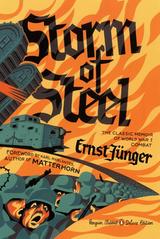 At the outbreak of World War I, Ernst Jünger (1895-1998) volunteered as an infantryman in the German army. He received the first of many wounds in April 1915 and, during his recovery, decided to become an officer. As a lieutenant, Jünger led an infantry platoon through several cataclysmic battles on the Western front, where he was well known for daring nighttime patrols and offensive initiatives. Jünger survived 14 wounds, the last of which was a shot through the chest that nearly ended his life during the 1918 Spring Offensive. He was awarded the Pour le Mérite, the German Empire's highest honor, one of just 11 given to infantry commanders during the war.
At the outbreak of World War I, Ernst Jünger (1895-1998) volunteered as an infantryman in the German army. He received the first of many wounds in April 1915 and, during his recovery, decided to become an officer. As a lieutenant, Jünger led an infantry platoon through several cataclysmic battles on the Western front, where he was well known for daring nighttime patrols and offensive initiatives. Jünger survived 14 wounds, the last of which was a shot through the chest that nearly ended his life during the 1918 Spring Offensive. He was awarded the Pour le Mérite, the German Empire's highest honor, one of just 11 given to infantry commanders during the war.
Jünger kept a diary of his wartime experiences. After the war, it was published essentially unedited as In Stahlgewittern, or Storm of Steel. Several revisions were made in the following decades. A version in the 1930s toned down some of the most graphic violence for international audiences and, in 2003, Michael Hofmann wrote a new English translation based on the final 1961 German manuscript. Hofmann's translation was published as a Penguin Classics Deluxe Edition last May ($18, 9780143108252), with a new foreword by Karl Marlantes, author of Matterhorn, and an evocative cover by Neil Gower.
Jünger's is unusual among accounts of World War I combat. It is savage, apocalyptic, though largely apolitical, in which the author finds a transcendent quality to warfare and its horrors. During his long life, Jünger was sometimes criticized for glorifying war, but Storm of Steel gives an important perspective for the World War I centennial, of not just what soldiers endured, but the attitude that allowed them to endure it. --Tobias Mutter

